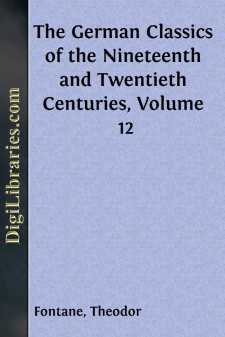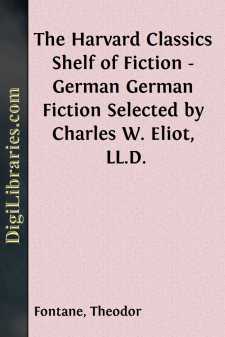Categories
- Antiques & Collectibles 13
- Architecture 36
- Art 48
- Bibles 22
- Biography & Autobiography 813
- Body, Mind & Spirit 142
- Business & Economics 28
- Children's Books 16
- Children's Fiction 13
- Computers 4
- Cooking 94
- Crafts & Hobbies 4
- Drama 346
- Education 46
- Family & Relationships 57
- Fiction 11829
- Games 19
- Gardening 17
- Health & Fitness 34
- History 1377
- House & Home 1
- Humor 147
- Juvenile Fiction 1873
- Juvenile Nonfiction 202
- Language Arts & Disciplines 88
- Law 16
- Literary Collections 686
- Literary Criticism 179
- Mathematics 13
- Medical 41
- Music 40
- Nature 179
- Non-Classifiable 1768
- Performing Arts 7
- Periodicals 1453
- Philosophy 64
- Photography 2
- Poetry 896
- Political Science 203
- Psychology 42
- Reference 154
- Religion 513
- Science 126
- Self-Help 84
- Social Science 81
- Sports & Recreation 34
- Study Aids 3
- Technology & Engineering 59
- Transportation 23
- Travel 463
- True Crime 29
Theodor Fontane
Theodor Fontane (1819–1898) was a prominent German novelist and poet, widely regarded as a leading figure of 19th-century German realism. He is best known for his social novels, particularly "Effi Briest," which explores the constraints of Prussian society. Fontane's works often delve into themes of societal norms, personal freedom, and the complexities of human relationships. In addition to his novels, he wrote travel literature, poetry, and historical essays, leaving a significant impact on German literature.
Author's Books:
Sort by:
by:
Theodor Fontane
THE LIFE OF GUSTAV FREYTAG By ERNEST F. HENDERSON, PH.D., L.H.D. Author of A History of Germany in the Middle Ages; A Short History ofGermany, etc. It is difficult to assign to Gustav Freytag his exact niche in the hall of fame, because of his many-sidedness. He wrote one novel of which the statement has been made by an eminent French critic that no book in the German language, with the exception of...
more...
by:
Theodor Fontane
The fact that newspaper reporters commonly call their articles "stories" points to a certain analogy between the novel and the newspaper. Even when prose fiction aims to be a fine art, it readily takes on a journalistic character; it is usually designed for immediate effect--at the concomitant risk of producing no other--and it easily passes from hand to hand or from country to country. In our...
more...



